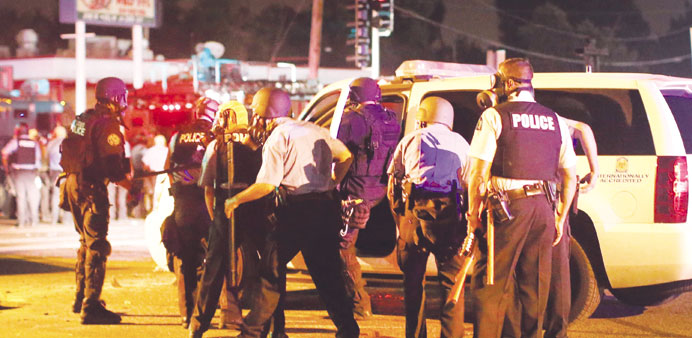Police take cover after gunshots ring out during a demonstration to protest the killing of teenager Michael Brown turned violent on August 17 in Ferguson, Missouri. Police shot smoke and tear gas into the crowd of several hundred as they advanced near the police command centre which has been set up in a shopping mall parking lot.
The calls for justice in the wake of the police killing of a young black man in a small St Louis suburb have reached the White House, where once again the nation’s first black president has faced demands for greater action to address historic injustices.
Barack Obama entered the national political scene with a speech proclaiming the triumph over historic divisions, and was largely able put aside racial questions during his 2008 political campaign.
Now for at least the third time in his presidency, Obama has been put in the uncomfortable position of walking a fine line between using his office to change the fate of the black community and avoiding appearances of favouritism.
Cries for Obama to do more have come as police in riot gear fire tear gas and rubber bullets and angry citizens loot local businesses.
The August 9 shooting of 18-year-old Michael Brown, an unarmed African-American, by a white police officer in Ferguson, Missouri, is reverberating around the world. Violent protests have led to looting and confrontations between police and demonstrators.
The developments have been shocking for many, evoking clashes during the Civil Rights Movement of the 1950s and 1960s - and, some say, even of dictatorial regimes cracking down on demonstrators.
“It is unbelievable that these ideas could run rampant in 2014. This is not 1940 or 1950 in America, but today it is hard to see the difference,” African American Congressman John Lewis said last week.
Missouri Congressman Emanuel Cleaver, who is also black, said on Tuesday that Ferguson was starting to look like the Iraqi city of Fallujah.
“Right now we have a community that has been essentially left behind in terms of racial progress,” he told MSNBC.
The American Civil Liberties Union points to the frequency with which unarmed black men are killed by police in the US, noting six such cases since April.
“The killing of black men in incidents that begin as investigatory police stops are anything but unusual in America. In this sense, Ferguson is Everytown, USA,” the rights group said in a statement.
In Ferguson, blacks account for 86% of police stops and 93% of arrests, the ACLU said. While the town is largely black, 90% of the police force is white.
Obama acknowledged on Monday that the African American community in Ferguson and nationwide has legitimate grievances, noting the “gulf of mistrust” between local residents and law enforcement.
“In too many communities, too many young men of color are left behind and seen only as objects of fear,” he said.
But he sought to appeal to Americans’ “shared humanity,” calling the nation “a united American family.”
“To a community in Ferguson that is rightly hurting and looking for answers, let me call once again for us to seek some understanding rather than simply holler at each other. Let’s seek to heal rather than to wound each other,” he said.
Obama has focused on raising the economic opportunities of all Americans, not just minorities, with an emphasis on the struggling middle and lower classes during the financial crisis and healthcare debates.
His “My Brother’s Keeper” initiative, aimed at helping young men of colour, was launched only earlier this year.
As president, Obama first saw how incendiary his remarks could be after he weighed in on the arrest of Africa-American Harvard professor Henry Louis Gates in 2009. Low enforcement was outraged.
His remarks in 2012 about slain black teenager Trayvon Martin - “if I had a son, he’d look like Trayvon” - drew questions about whether he was inserting himself into a local police matter.
Obama’s remarks on Ferguson reflect lessons learned from those events.
“I’ve got to make sure that I don’t look like I’m putting my thumb on the scales one way or the other,” he said, when asked whether he would visit Missouri.
“So it’s hard for me to address a specific case beyond making sure that it’s conducted in a way that is transparent, where there is accountability, where people can trust the process.”
Once again Obama finds himself urging unity and calm, while calling for the need to address historic racial grievances.
“Part of the ongoing challenge of perfecting our unions has involved dealing with communities that feel left behind - who as a consequence of tragic histories often find themselves isolated, often find themselves without hope, without economic prospects,” he said.
With tensions showing little sign of abating, Attorney General Eric Holder visited Ferguson on Wednesday to meet with US officials investigating Brown’s death.
In a rare moment of his 2008 campaign focused on racial issues, Obama acknowledged that the US often seemed stuck in a “racial stalemate” and that his historic candidacy would not change longstanding racial divisions.
In a speech in Philadelphia he said he believed “that working together we can move beyond some of our old racial wounds, and that in fact we have no choice if we are to continue on the path of a more perfect union.”
Nearly six years later, that process remains far from complete.

